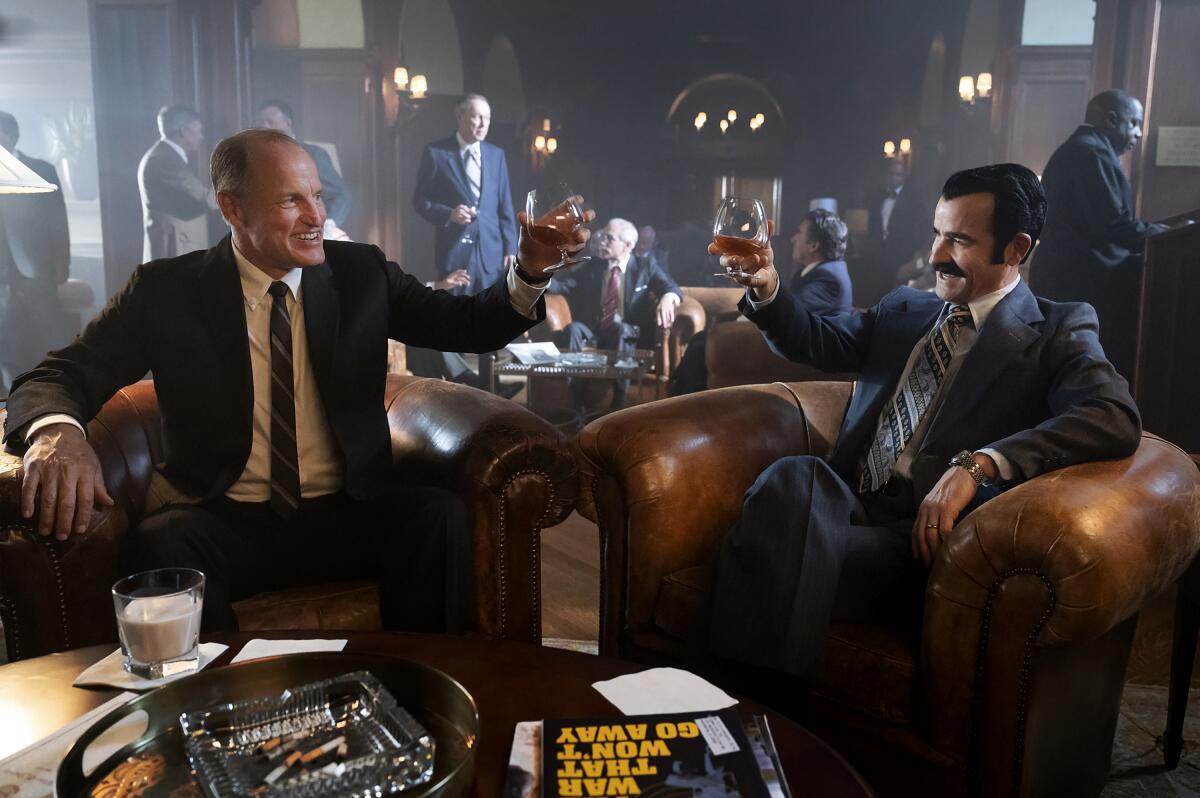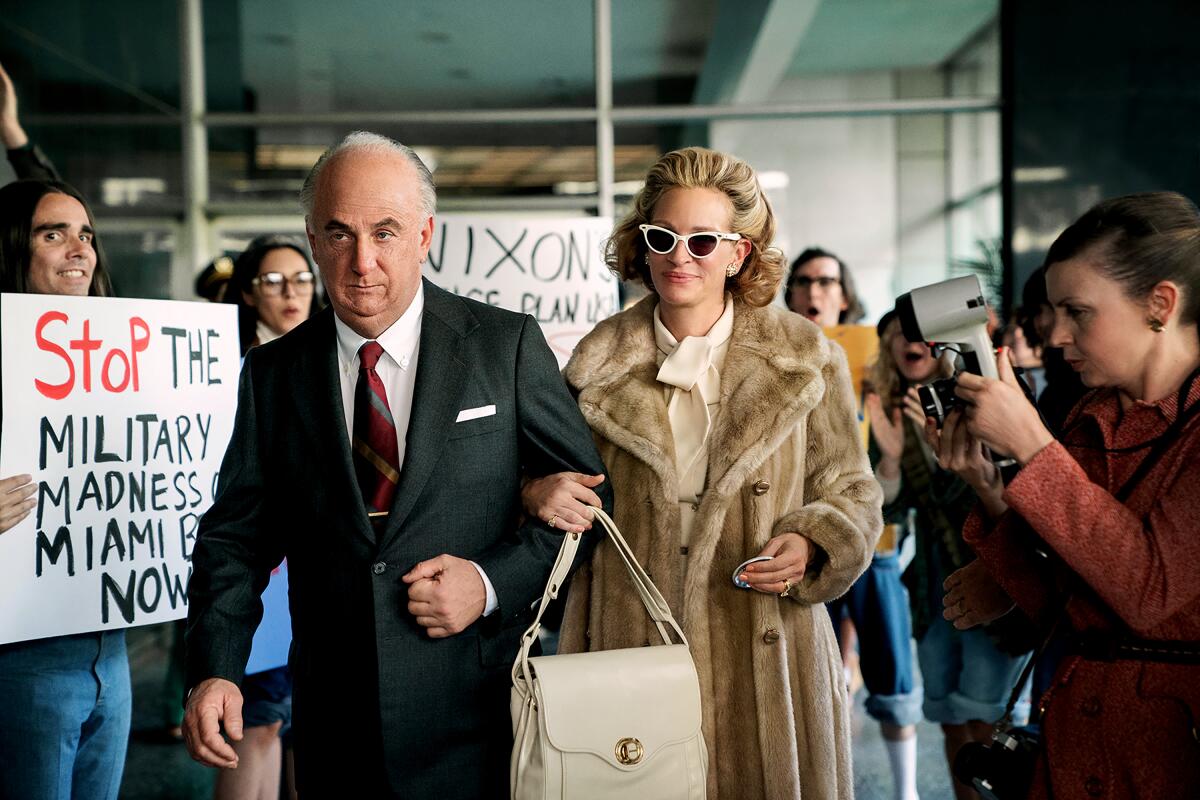How ‘White House Plumbers’ creators put a juicy, new spin on the familiar Watergate story

- Share via
We’ve seen the Watergate story through the eyes of the reporters who broke it (1976’s “All the President’s Men”). We’ve seen it through the eyes of White House counsel John Dean (the 1979 miniseries “Blind Ambition”). We’ve even seen it through the eyes of two teenage girls (the underappreciated 1999 comedy “Dick”). The ultimate political scandal has been an ever-flowing fount of pop culture practically since the moment resigned president Richard Nixon flashed double peace signs and boarded his helicopter out of Washington.
But there’s always another angle, and HBO’s five-part limited series “White House Plumbers” found a juicy one. Created by the team behind “Veep,” this is the Watergate of E. Howard Hunt (Woody Harrelson) and G. Gordon Liddy (Justin Theroux), the real-life blinkered zealots who, er, masterminded the break-in and took the brunt of the fall when everything went south. It’s a combination buddy comedy/buddy tragedy about a pair of true believers who keep charging ahead through blind loyalty and a desperate need to grind axes, even as the walls close in.
Creators and writers Alex Gregory and Peter Huyck barely even needed to include jokes.
“The tone was played very straight, because the characters were so absurd,” Huyck said. “You just let all the comedy come from the characters and let those scenes play out. If the scenes are dramatic, that’s what the scenes are supposed to be. And if they were absurd, that’s what they were supposed to be. But we never really tried to push the tone in any way that didn’t suit the material.”
Hunt, a former CIA agent still fuming from the Bay of Pigs fiasco, and Liddy, whose tenure with the FBI did not end well, had plenty in common. They both loved Nixon and hated John Kennedy and the counterculture, which they saw as a threat to patriotism and the American way of life. Brought together by Nixon operatives to break into the office of Daniel Ellsberg’s psychiatrist — Ellsberg was responsible for leaking the Pentagon Papers, the classified Pentagon study of Vietnam War decision-making — they were then enlisted to execute other political dirty tricks, including breaking into the Democratic National Committee headquarters at the Watergate hotel and office building.
“They kind of fall in love,” said series director David Mandel. “They are together. They are in it. They could not be having a better time until things start to go wrong. And then it falls apart.”

With Washington, D.C., once again ridden by scandal, Watergate is a hot topic. A fat new nonfiction book, Garrett M. Graff’s “Watergate: A New History,” was published last year. Also last year, Starz released the limited series “Gaslit.” Like “White House Plumbers,” it focuses on the perspectives of peripheral figures, including Martha Mitchell (Julia Roberts), the wife of Attorney General John Mitchell (played by Sean Penn), and the strong-arm efforts to silence her during the scandal. (Mandel, Gregory and Huyck said they didn’t watch “Gaslit,” partly because the two series were competing for casting, but they plan to.)
Still, there was no shortage of study material. As Huyck says, “All the President’s Men” is “the ne plus ultra” of Watergate entertainment. But it’s more of a journalism thriller than a study of political scandal. Oliver Stone’s “Nixon” dips into Watergate, but within the larger context of the president operating behind the scenes. The “White House Plumbers” creators are all big fans of “Dick,” the comedy in which a pair of precocious high schoolers (Michelle Williams and Kirsten Dunst) inadvertently topple the Nixon presidency, and Bob Woodward (Will Ferrell) and Carl Bernstein (Bruce McCulloch) are portrayed as preening peacocks who stumble into the story of their lives.
“That movie is an unheralded gem about Watergate,” Gregory said. “I love every second of it.” It’s also probably closer in spirit to “White House Plumbers” than other Watergate offerings: biting satire about deadly serious matters.
Huyck and Gregory found inspiration in disparate places. The 2019 limited series “Chernobyl” taught them there is always more to learn about a subject you thought you knew. Then there are the Coen brothers, whose heroes (and villains) tend to come from the margins. “They have a knack for somehow making the little guy feel important,” Gregory said. “You’re always following some sort of heel on some crappy mission. It’s not like they’re going to save the world. It’s some incompetent person trying to kidnap a baby or whatever. Hunt and Libby were two guys trying to claw their way out of obscurity.”
They are, as presented here, pretty ridiculous, Hunt pounding away at writing spy novels and growling at his lefty kids, Liddy prancing around like a parody of he-man machismo and failing to hide his deep admiration for Hitler. “He and Harlan Crow would have had a lot to chat about,” Mandel said. “Liddy would have been very jealous of his collection.”
Ultimately, the writers and director relied on their protagonists. Hunt and Liddy didn’t see themselves as absurd. When they looked in the mirror, they saw the ultimate patriots, and they were willing to do whatever it took to prove themselves. They were, in a sense, the straight men in their own comedy.
“The more seriously people take themselves, the funnier they are,” Gregory said. “These guys took themselves very seriously.”
These interviews took place before the writers’ strike.
More to Read
From the Oscars to the Emmys.
Get the Envelope newsletter for exclusive awards season coverage, behind-the-scenes stories from the Envelope podcast and columnist Glenn Whipp’s must-read analysis.
You may occasionally receive promotional content from the Los Angeles Times.










